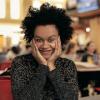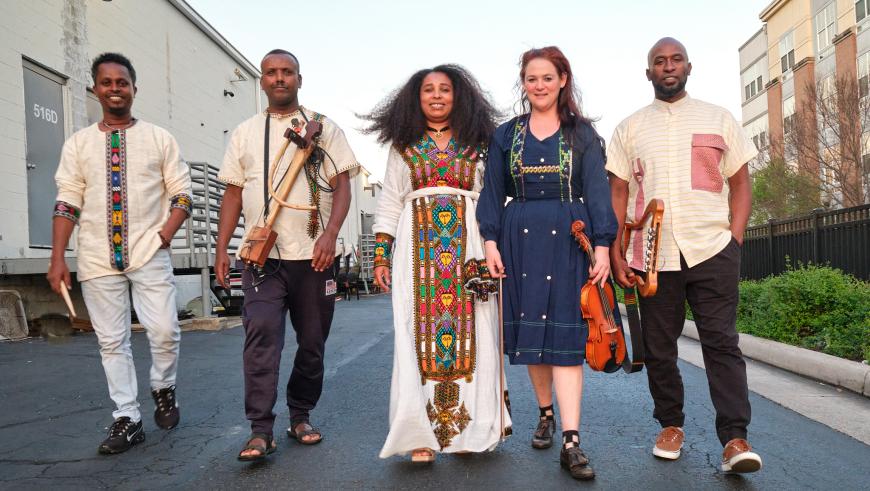
This Sept. 12 marks half a century since Emperor Haile Selassie was deposed by the Derg, a brutal Marxist-Leninist junta that killed more than a million Ethiopians during the mid-1970s Red Terror campaign and subsequent famines. While Oromo musicians had been persecuted under Selassie in his attempt to tamp down a rising separatist movement among Ethiopia’s largest ethnic group, the advent of the Derg brought down the curtain on what’s now seen as Ethiopian music’s golden age. Many of these artists fled the regime, a diaspora that continues to shape Ethiopian music.
Mulatu Astatke, the composer, vibraphonist, and percussionist who fathered the sleek, incantatory style known as Ethio-jazz in the early 1970s, managed to stay active in Addis Ababa even as many of his confederates went into exile. Over the past two decades, he’s become Ethiopia’s best-known musical ambassador, but when he returns to Berkeley for two shows at The UC Theatre June 12–13, presented by Jazz Is Dead, he’ll be accompanied mostly by non-Ethiopian Western musicians.
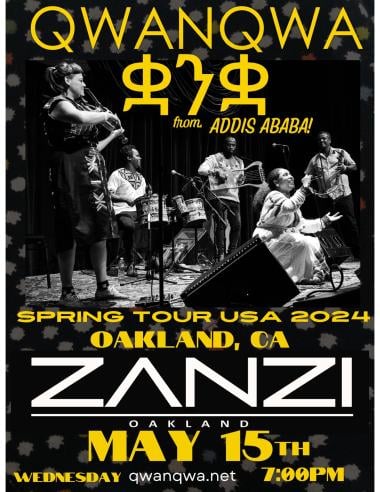
For a glimpse at the creative ferment taking place in Addis Ababa today, the act to catch is Qwanqwa, a quintet featuring leading Ethiopian musicians organized by Santa Cruz violinist Kaethe Hostetter. In the midst of an extensive North American tour, the group plays a series of gigs across California, including on May 15 at Zanzi in Oakland, on May 16 at the Yerba Buena Gardens Festival, and later that same evening at Santa Cruz’s Kuumbwa Jazz Center. The group’s Southern California dates include May 17 at Corazón Performing Arts in Topanga, May 18 at the Joshua Tree Music Festival, and May 19 at Zebulon in Los Angeles’ Frogtown neighborhood.
Hostetter plays five-string electric violin, but the band is built on traditional Ethiopian string instruments, with Endris Hassen on masinko (one-string fiddle) and Bubu Teklemariam on bass krar (Ethiopian lyre). Percussionist Misale Legesse helps hold down the low end on kebero (goatskin drum). The band’s newest member, Selamnesh Zemene, has transformed Qwanqwa with her charismatic vocals.
The concept for the collective came together in 2012, when Hostetter’s search for experimental-minded Addis players steeped in traditional Ethiopian music coalesced in Qwanqwa (which means “language” in Amharic). Over its first decade, the group released three eponymous albums with an array of musicians, but the quintet on tour has been the core lineup in recent years and is featured on the new double album QWANQWA Live.
Pressed on multihued vinyl, the project documents the final shows from the band’s 2022 debut U.S. tour (including tracks from Corazón in Topanga). It’s the first release to document Qwanqwa with Zemene’s vocals, and the high-energy performances “use the audience as fuel,” said Legesse on a recent video call with Hostetter from Wyoming.
The band was in the state for its current tour, “doing morning workshops for cowboy kids with belt buckles, super burly, getting ready for their fence-post jobs in the summer,” Hostetter said.
“There’s a big difference playing on the stage with this band,” Legesse continued. “Previous albums have a bunch of different people, but this is the band we’ve been for the last five years. This is our sound.”
One reason why this iteration of Qwanqwa has forged such a powerful identity is that the Ethiopian musicians had long-standing relationships with each other before they connected with Hostetter. They all played together for years in the popular Ethiocolor combo led by Melaku Belay, a dancer, entrepreneur, and activist who performs internationally and supports a school for street kids.
The top Addis musicians perform internationally, Legesse explained, and work in an array of idioms. He also plays African percussion and congas in Latin music bands and is in demand for recording sessions and as an accompanist for popular singers. The three Addis-based Qwanqwa instrumentalists often work in the Netherlands, France, and Italy, where they’ve collaborated with Italian-Ethiopian writer and singer Gabriella Ghermandi.
In many ways, the vibe of the current tour was set by a Chicago concert with jazz cellist Tomeka Reid, a former composer-in-residence at Mills College who was awarded a 2022 MacArthur “genius” fellowship. While traveling through Ethiopia, Reid met up with Hassen, who ended up performing a duo show with the cellist. Hostetter met Reid at the gig, “and we started brainstorming,” the violinist said. “We’re both organizer types.”
The plan they set in motion culminated with a collaboration pairing Qwanqwa with Hear in Now, an improvisational ensemble Reid co-leads with violinist Mazz Swift and bassist Silvia Bolognesi. “So our very first show was experimental, and we’ve taken a little bit of that energy for every performance since,” Hostetter said. “Playing night after night, we have to be careful not to get stuck, and it really helps to bring something new.”
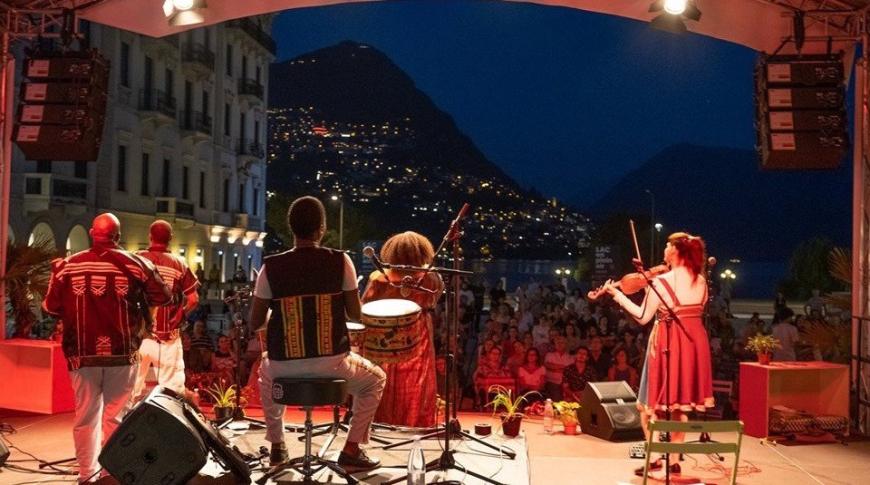
Falling into a creative rut doesn’t seem to be much of a hazard for Hostetter. When she’s not in Addis or touring with Qwanqwa, she’s been working as tour manager for the great Malian band Bassekou Kouyaté & Ngoni Ba. (“Ngoni is my favorite instrument,” she said about the traditional calabash-mounted West African string instrument.) She’d acquired a van for Qwanqwa in 2022 and connected with Kouyaté when he wanted to rent the vehicle for Ngoni Ba’s 2023 U.S. tour.
“They found out I spoke French, and I became their tour manager,” Hostetter said. “And they asked me to bring my instrument with me, so I’ve started to collaborate with him and his son, Mamadou Kouyaté, who’s been working with Kronos Quartet” as part of Trio Da Kali.
Hostetter also just released The Garden, a gorgeous duo album with Japanese accordion player Marié Abe, who recently returned to the Bay Area to take an associate professorship in ethnomusicology at UC Berkeley (where she earned her doctorate). Featuring a diverse program for five-string viola and accordion, the 14 tracks encompass folk and pop influences from Ethiopia, Japan, and many other sources, reflecting the territory the two women have traversed.
They met in Boston in the aughts, when Abe was a postdoctoral fellow at Harvard and Hostetter was avidly exploring Boston’s supercharged acoustic music scene. Hostetter ended up helping found Debo Band at the end of the decade, a group that Abe played in for years. Directed by Ethiopian American saxophonist Danny Mekonnen, the sprawling 10-to-12-piece collective gained an avid national following with a rollicking sound rooted in Ethio-jazz and Ethiopian folk rhythms while also drawing on far-flung sources like Balkan music, punk, and acid rock. When the group made its first trip to Ethiopia in 2009, Hostetter decided to stay.
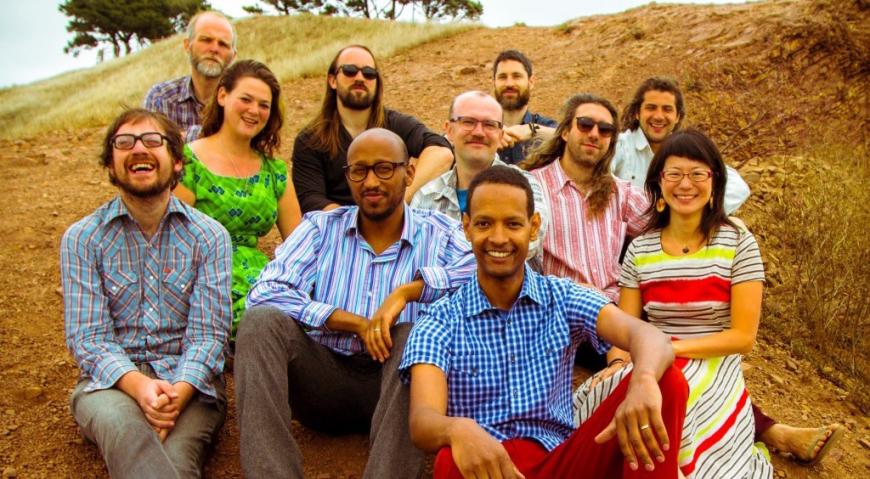
Rather than dropping out of Debo, Hostetter realized she could provide a direct bridge to the Addis scene, traveling back and forth from Ethiopia to Boston, particularly for the summer festival season. “I would always bring new music,” she said, “injecting what I was hearing straight from Addis.”
Studying Amharic, one of the ethnically diverse nation’s five official languages, she sought out the city’s leading traditional musicians, “searching for experimental minds and fluency in tradition, which can be seen as opposites,” she said. “But I was giving it time while I was learning the language, which really helped [me] get deeper into the music because, like Amharic, the melodies are so syncopated.”
Her efforts have born delectable fruit with Qwanqwa, which is shining a spotlight back on Addis at a time when the scene is ripe for rediscovery. Astatke himself has been plugging back in recently, like at a March tribute concert for him at the Addis club African Jazz Village.
Legesse and Hassen were in the thick of the action, performing many of Astatke’s classic pieces from the 1960s and ’70s, “music I listen to almost every day,” Legesse said. “We did all the old songs — and some new — but mostly the well-known compositions. He’s a legacy artist who’s kind of separated himself. But his compositions, for me, are the big point. He’s the father of Ethio-jazz and such an important part of our history.”
The next chapter in Ethiopian music is now being written, and Qwanqwa is an essential part of the story.




